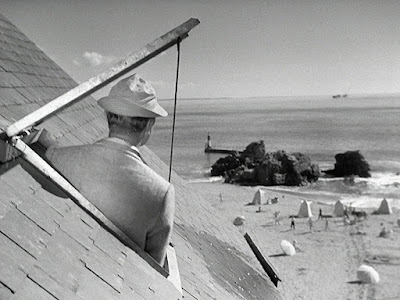Thursday, July 11, 2019
Mr. Hulot's Holiday
For some inexplicable reason, I decided yesterday to watch the 1953 debut of Jacques Tati's screen character Monsieur Hulot, Les Vacances de Monsieur Hulot, known to English-speaking audiences as Mr. Hulot's Holiday.(1) I haven't seen it since I wrote about it ten years ago on this blog in a post I called "A Brief Vacation." But I remember the experience of watching it for the first time in a theater almost forty years ago. I felt then that it was charming - sufficiently delightful to justify its reputation. It is a bonafide classic - which means that most people accept it unquestioningly as an untouchable masterpiece, to place proudly alongside Chaplin's City Lights or Keaton's Sherlock, Jr. But what, then, is a "classic"? In his 1975 piece, "Jan Troell: A Portrait," Vernon Young makes an oh-so-necessary point: "If the word classic has any value left (after being attributed to movies which are merely old and, if truth be said, often inhumanly tedious), Here Is Your Life and the brace of Emigrant films are classics; they define with unique richness the material of which they are composed."(1)
In his 2004 essay for Criterion, David Ehrenstein called Mr. Hulot's Holiday, "One of the most original—and hilarious—comedies ever made."(2) Really? Even Roger Ebert had reservations. "The first time I saw Jacques Tati's 'Mr. Hulot's Holiday,'" Ebert wrote in 1996, "I didn't laugh as much as I thought I was supposed to. But I didn't forget the film, and I saw it again in a film class, and then bought the laserdisc and saw it a third and fourth time, and by then it had become part of my treasure. But I still didn't laugh as much as I thought I was supposed to, and now I think I understand why. It is not a comedy of hilarity but a comedy of memory, nostalgia, fondness and good cheer. There are some real laughs in it, but 'Mr. Hulot's Holiday' gives us something rarer, an amused affection for human nature--so odd, so valuable, so particular."(3)
In my experience of Tati's film, the trajectory was reversed: the film has shrunk with each subsequent viewing. I get Ebert's point about the film's evocation of "memory, nostalgia, fondness and good cheer." The film is dripping with the mood of summer vacations - even of the strange compulsion to have them once a year, along with everyone else in the Western world. The crazy rush to the train station, the panic and congestion and the long journey off the been track to arrive - at last - at the beach. I am there completely. And the wistfulness of the end - it hurts a little every time I see it.
But after seeing it again on home video in the '80s, then on laserdisc, and DVD (every new medium gives us an excuse to watch all these old films again), it got smaller, thinner, less substantial each time. The word "charming" continues to rise to my fingertips. But I feel less obliged than ever to call the film great. Sixty-six years after it was made, if the word classic still has a meaning, Mr. Hulot's Holiday is not one.
(1) But why the Anglicism "Holiday" when Vacation is closer to "Vacance"?
(1) Vernon Young, "Jan Troell: A Portrait," reprinted by permission from Jan Troell, edited by Lars-Olof Lothwall (Stockholm: The Swedish Film Institute, 1975).
(2) "Mr. Hulot's Holiday," David Ehrenstein
(3) "Great Movie: Mr. Hulot's Holiday," November 6, 1996.
Labels:
Buster Keaton,
Chaplin,
Jacques Tati,
Jan Troell,
Roger Ebert,
Vernon Young
Subscribe to:
Post Comments (Atom)

You don't seem to like movies just for the fun of them.
ReplyDeleteLet's just say that I have a funny sense of fun.
Delete